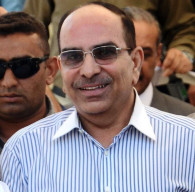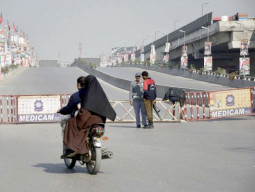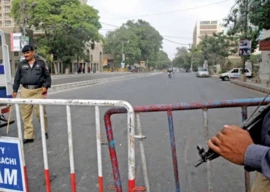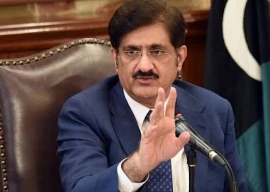
When you look at Rayyan, you cannot tell the little one underwent a surgery merely two weeks ago. It is not until you notice the scar on his head, right behind his ear that you realise that the beaming two-and-a-half-year-old recently gained the ability to hear.
Rayyan was born with a hearing disability that meant he could neither hear anything nor could he speak. Rayan’s mother, Mehwish, speaking to The Express Tribune, said that she had discovered this when he was nine months old. Ever since then, it had been an endless story of visits to specialists and medical tests but to no avail. “Whenever I called him or tried to get his attention, he never responded, which bothered me,” she said. “I discussed the issue with my husband and we visited an ENT specialist.” The specialist prescribed the use of a hearing aid but they didn’t work very well, she recalled. The family gained more hope when they came across the Dow University of Health Sciences (DUHS) programme in an advertisement. “We got our child registered immediately.”
The DUHS performed two successful cochlear implant surgeries free-of-charge on Rayyan and three-and-a-half-year-old Hamza Arif - both of whom belonged to poor families whose parents could not afford to pay for the expensive treatment. “We could not afford to pay for the Rs1.4 million surgery. We are very grateful to the DUHS for helping us battle our son’s disability.”
Registration for surgery

“We want to play our part in making every child a useful person and a productive member of society,” explained the DUHS pro-vice chancellor and ENT department head, Prof. Dr Umer Farooq, in an exclusive interview with The Express Tribune.
Around 235 children suffering from similar conditions to Rayyan are currently registered with the DUHS for surgery, said Dr Farooq.
Dr Farooq said that parents of mute children had been invited to get them examined and subsequently registered for the surgical procedure if found deserving. Regarding the selection criteria, he said that a major consideration for the implant was the child’s chances of restoration and the parents’ economic status as the resourceful could manage to pay for the expenses.”We provide treatment on first-registered first-served basis,” he said.
How the implant works?
Cochlear implant consists of external and internal parts: the internal parts are placed surgically in the bone behind the ear and in the inner ear. The external part looks like a hearing aid and can be detached at any time.
Dr Farooq said that it was better to operate on children under the age of five to ensure better results. The chances of the procedure working for children over the age of 10 were relatively slim. Meanwhile, cochlear implant surgery could be performed on adults as well in cases of partial hearing loss due to illness or trauma.
Future prospects
Being an expensive treatment, it is difficult to continue it without the support of the government and other organisations. “I have written a letter to the Ministry of Special Education to provide us with at least100 implants a year so we may continue this initiative in the future,” said Dr Farooq.
Dr Farooq said that the cost of an implant could be even lower if ordered in bulk. There are companies in Australia, America and Austria that manufacture these implants and provide them in bulk quantities. “If we order in bulk, one implant will cost Rs1.1 million instead of Rs1.4 million. We can perform 8 to 10 surgeries in a month. If we get funding, we plan to perform 100 surgeries a year,” he said.
Published in The Express Tribune, July 18th, 2013.
COMMENTS (3)
Comments are moderated and generally will be posted if they are on-topic and not abusive.
For more information, please see our Comments FAQ
1736579961-0/fizza-(1)1736579961-0-405x300.webp)






1736584046-0/Untitled-design-(26)1736584046-0-270x192.webp)




1736508423-0/Express-Tribune---News-Desk-(9)1736508423-0-270x192.webp)










I urge all to please come forward and help them.
God Bless you All , who devoted their life for such noble cause.
Good job DUHS - good luck to Rayyan and his family.